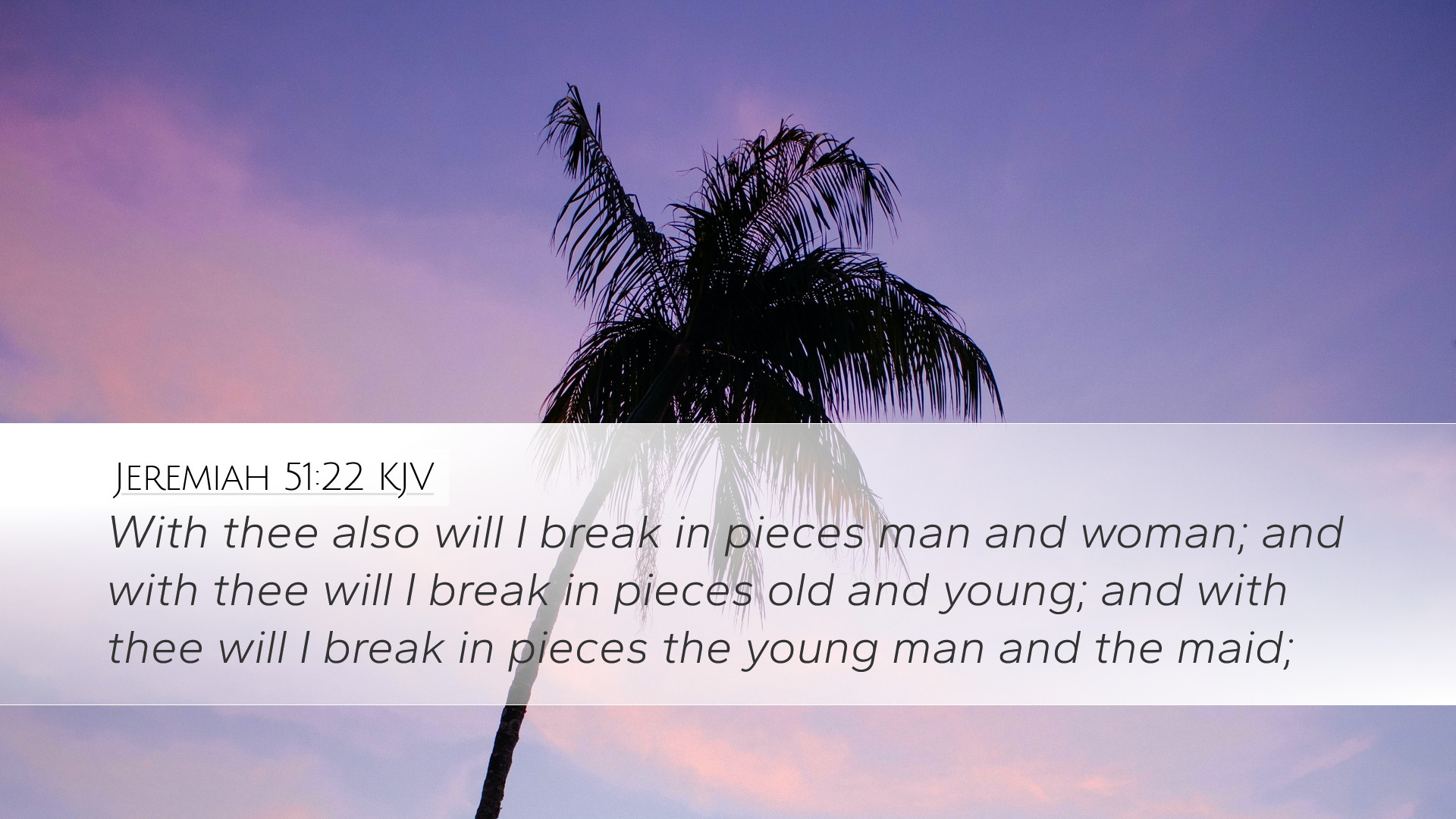Commentary on Jeremiah 51:22
The verse in focus, Jeremiah 51:22, states:
"With thee also will I break in pieces man and woman; and with thee will I break in pieces old and young; and with thee will I break in pieces the shepherd and his flock."
This verse finds itself within the larger context of Jeremiah's prophetic discourse concerning the impending judgment against Babylon. This commentary explores various insights derived from acclaimed public domain commentaries by Matthew Henry, Albert Barnes, and Adam Clarke, providing an in-depth examination beneficial for pastors, students, theologians, and Bible scholars.
Contextual Overview
Jeremiah 51 is a direct discourse against Babylon, a nation emblematic of idolatry and oppression. The prophet Jeremiah conveys God's intention to dismantle the power structures of Babylon, illustrating a comprehensive judgment that applies to all societal strata. The reference to “man and woman” indicates that judgment is universal, encompassing all genders and ages, as God holds Babylon accountable for its sins.
Matthew Henry's Insights
Matthew Henry, in his classic commentary, emphasizes the universality of God's judgment expressed in this verse. He states:
"This indicates that no person, regardless of status or age, will escape the Lord’s judgment."
- Divine Justice: Henry notes that the breaking in pieces signifies God’s righteous judgment. All, from the elderly to the youth, the powerful and the marginalized, are included in God's equitable justice.
- Symbol of Destruction: The breaking in pieces serves as a metaphorical illustration of total destruction. The imagery suggests not only physical destruction but also the shattering of morale and societal structures within Babylon.
- All Classes Judged: The prophet highlights the fate of the shepherd and his flock, indicating that even those who lead will not be spared, underlining the comprehensive nature of the judgment.
Albert Barnes' Interpretation
Albert Barnes provides a detailed look at each section of the verse, introducing significant theological implications:
"The judgments will be upon all classes and conditions, thus portraying God’s authority over both the rulers and the common people."
- Inclusivity of Judgment: Barnes highlights that the Lord's judgment is impartial. His breaking into pieces spans all demographics—man, woman, young, and old—revealing no bias in divine justice.
- The Shepherd's Role: In referencing the shepherd and flock, Barnes elucidates that leaders bear significant responsibility and will face the consequences for leading their people astray.
- Impending Destruction: Barnes emphasizes that this verse is a warning of impending destruction, underscoring that God uses nations as instruments for His purposes, whether for blessing or judgment.
Adam Clarke's Commentary
Adam Clarke provides additional layers to the understanding of this passage, focusing on the theological and moral implications:
"This is a strong assertion of God’s will to judge the world through His providence, ensuring that no sin remains unaddressed."
- Divine Sovereignty: Clarke underlines God’s sovereignty in executing judgment. The phrase 'with thee' signifies that God is actively involved in the decline of Babylon, illustrating His omnipotence.
- Judgment Across Generations: The mention of 'old and young' highlights that judgment spans generations, with the implication that no part of society is exempt from accountability.
- Call to Reflection: Clarke encourages readers to see this as a reflective moment about their own lives and communities, prompting self-examination concerning righteousness and moral standing before God.
Theological Implications
Jeremiah 51:22 stands as a poignant reminder of God's moral governance of the world:
- Nature of Sin: The verse underscores the serious nature of sin and its consequences—God’s patience is not endless.
- Impartial Judgment: It highlights that God's judgment is impartial and affects all individuals, regardless of their earthly status.
- Hope and Redemption: While the immediate context is one of judgment, for the faithful, it also serves as a reminder that God's justice paves the way for eventual restoration and hope.
Conclusion
Jeremiah 51:22 encapsulates a profound declaration of God's intention to judge not only a nation but its very fabric, sustained by compelling theological themes of justice, accountability, and divine sovereignty. Contemporary readers are invited to reflect deeply upon the implications of this verse, aligning their lives and ministries with the call to genuine righteousness before a holy God.


